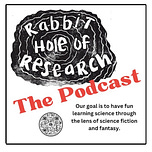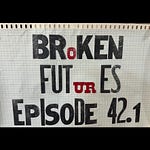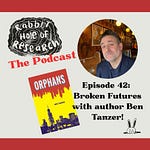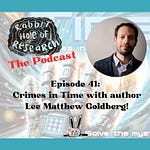In this mini companion to Episode 36: Loki, Satire and Chaos, the Rabbit Hole of Research team offers a fast-paced recap of their conversation with author Kurt Baumeister, whose novel Twilight of the Gods reimagines Loki as a postmodern, ethically ambiguous figure. They revisit themes of mythology, chaos, and satire, explore AI as a digital trickster, and add new pop culture figures to their growing pantheon of modern Lokis—including Gwenpool, Jinx from Arcane, and Harley Quinn. The crew also field a listener question on where to start with Doctor Doom and share what they’re watching and reading—from The Rehearsal to Overgrowth by Mira Grant. Plus, they tease their Fantastic Four science series leading up to the MCU reboot. It’s a quick trip down a very chaotic mini-hole.
It’s science, it’s fiction, it’s science for weirdos.
And don’t forget to Pre-order: Red Line: Chicago Horror Stories Anthology featuring a new story by Joe!
Want to support the show? Tell your friends. Follow us on social media, Discord, share the podcast, and let us know what topics you are excited about. And to see all the content (studio images and artwork) subscribe to the Rabbit Hole of Research newsletter!
Stay curious, stay speculative, stay safe, and we’ll catch you in the next rabbit hole. Love Y'all!
Future Episodes & Events:
Fantastic Four Science Series (Episodes 37–40) – Leading up to the MCU Fantastic Four movie (releasing July 25, 2025):
Ep. 37 (June 11): Sue Storm-Richards: Invisibility — with comic critic Nick Ulanowski
Ep. 38 (June 25): Ben Grimm “The Thing”: Strong Skin — featuring NYT bestselling author, Jonathan Maberry
Ep. 39 (July 9): Johnny Storm “The Human Torch”: Human Combustion — with Dr. David Pincus, returning guest
Ep. 40 (July 23): Reed Richards “Mr. Fantastic”: Stretching and Biophysics — with Dr. Maria Dowell, MD, Northwestern University
Links, Resources, and Topics Mentioned in mini and/or full episode:
Tricksters & Pop Culture
Kurt Baumeister, author of Twilight of the Gods →
Trickster archetypes: Loki, Rod Serling, Q (Star Trek), The Doctor (Doctor Who), Gwenpool, Harley Quinn, Jinx (Arcane)


Reading & Viewing Picks
Book: Overgrowth by Mira Grant (Seanan McGuire)
Show: The Rehearsal (HBO) – Nathan Fielder
Show: The Last of Us Season 2
Comics Mentioned
Fantastic Four modern runs
Battleworld event
Spider-Man x Doctor Doom arcs (Doom as Sorcerer Supreme)
Science & Fiction Connections in Episode:
Chaos Theory & Butterfly Effect
Science Angle: In chaotic systems, tiny inputs can cause massive, unpredictable outcomes (sensitive dependence on initial conditions).
Loki Connection: Loki’s minor actions often lead to world-altering consequences (e.g., cutting Sif’s hair leads to the forging of Mjölnir).
AI Hallucinations as Digital Trickster Behavior
Science Angle: Large language models generate hallucinated content—plausible but incorrect, mimicking human creativity.
Loki Connection: Loki mirrors this digital mischief—creating illusion, ambiguity, and destabilizing information ecosystems.
Narrative Chaos and Strange Attractors
Science Angle: In nonlinear dynamics, strange attractors describe repeating but unpredictable system behavior.
Loki Connection: Loki is a recurring agent of disruption in myth—he bends narrative logic but never fully escapes it.
Quantum Identity & Multiverse Variants
Science Angle: The multiverse interpretation of quantum physics allows for multiple versions of an individual coexisting across timelines.
Loki Connection: Multiple Loki variants (MCU, myth, satire) embody identity fluidity and divergent destiny.
Archetypes as Emergent Cognitive Patterns
Science Angle: Jungian and cognitive science suggest that archetypes are neural compressions for navigating complex social dynamics.
Loki Connection: Loki recurs across cultures (Coyote, Anansi, Q, The Doctor) as a cognitive tool for confronting disorder.
Gender and Biological Fluidity
Science Angle: Shape-shifting and gender fluidity parallel ideas in epigenetics, plasticity, and identity theory.
Loki Connection: Loki gives birth (to Sleipnir), changes gender and species—symbolizing extreme mythic flexibility.
Don’t forget to Rate the show!

















